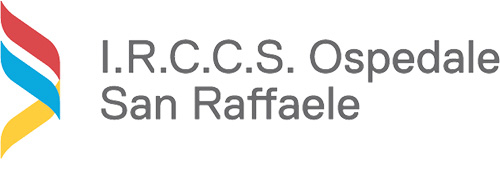
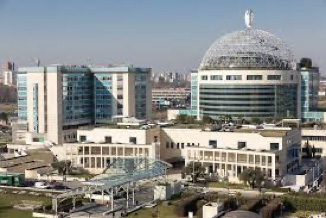
IRCCS Ospedale San Raffaele
IRCCS Ospedale San Raffaele is one of the leading biomedical research institute in Italy and Europe. In 2021 alone researchers working in the institute published 2306 papers, with a mean impact factor of 6,8 and a total impact factor of 15,6.
Ospedale San Raffaele is at the forefront of biomedical innovation thanks not only to its basic research activity, but also to the development and testing of new therapies. Its commitment to the improvement of clinical practice is proven by more than 880 ongoing clinical trials and by more than 452 new study proposals submitted to the institutional review board of IRCCS Ospedale San Raffaele in 2020 alone.
In line with major university hospitals in EU and worldwide, Ospedale San Raffaele has committed to developing its innovative projects also through the creation of dedicated companies, where investors, management teams, and investigators jointly address the translational process with combined science and managerial strenghts.
Business Development promotes the creation of new companies in the health sector and manages and supports, also through incubation services, the current portfolio of San Raffaele’s start-ups.
Collectively, OSR’s start-ups have raised over 80 mln Euro from private investors, public funding and venture capital as of 2021. Among the most notable success cases we can find Genenta Science, which represents the first Italian biotech company to be listed on the NASDAQ and Epsilen Bio, which through its merger with Chroma Therapeutics, created the largest epigenetic editing firm in the world.
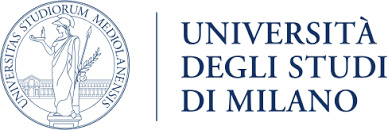

Università degli Studi di Milano and Fondazione UNIMI
The University of Milan is a leading Italian university for investment in research infrastructure and human capital: two essential elements for tackling the complex challenges of knowledge in a rapidly changing social and industrial context.
With 31 departments, 62 Coordinated Research Centres, +13.000 enrolled students for the year 2021-22 and over 900 researchers, the University of Milan represents a national benchmark for academic research in different areas, out of which the life sciences and the biotechnologies excel.
In addition to its two key functions – scientific research and education – the University engages in Third Mission activities aimed at spreading culture, knowledge and transferring research results outside the academic community, thus contributing to social and cultural growth.
From 1992 till today, the University of Milan has filed around 300 patents, of which around 40% fall in the life sciences subject. A scientific specialisation which dates back to its very first filed patent, precisely in the chemical-pharmaceutical field. Since then, the University has continued to excel in the area until today which counts 4 active spinoffs, of which one, CheckMab, has raised over €10 million in a Series-a round.
Powered by the University of Milano, UNIMI Foundation represents its tech transfer hub. UNIMI Foundation is the gateway to the University’s talent pool, drawing on the skills of >3,000 researchers and technicians from 31 departments, bridging the academia with the market. UNIMI Foiundation is a strategic partner in innovative projects and processes for companies and institutions that need scientific research as the key to improve their competitive positioning


Human Technopole
Human Technopole is Italy’s new research institute for life sciences.
After representing and celebrating Italian excellence to the millions who visited EXPO Milan 2015, the Italian Government decided to carry on the EXPO legacy by creating an open research centre to foster collaboration and bring added value to the scientific research ecosystem across Italy and Europe.
Today Palazzo Italia, the former Italian pavilion at EXPO Milan 2015, has been completely refurbished and is the institutional headquarters of Human Technopole. Through an interdisciplinary approach based on the creation and sharing of knowledge, Human Technopole promotes innovation in the healthcare sector and aims at improving human health and well-being. Once fully operational the institute will employ 1,500 people including over 1,000 scientists across a range of fields: biology, bioinformatics, chemistry, engineering, mathematics and computer science who will have over 35,000 square metres of laboratory space to work together on research activities of biomedical relevance.
Human Technopole aims to increase public and private investments in scientific research and to be actively involved in the promotion of scientific knowledge by strengthening the message that science is a global public good.
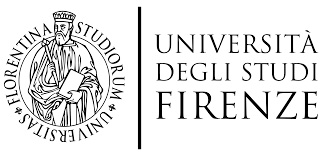

Università degli Studi di Firenze
The origins of the University of Florence date back to the Studium Generale set up by the Florentine Republic in 1321. The subjects taught were Civil and Canon Law, Literature, Medicine. There have been illustrious scholars such as Giovanni Boccaccio, who lectured on the Divina Commedia.
Today is one of the largest research and higher education institution in Italy, with 1,800 lecturers and internal research staff, 1,600 technical and administrative staff, and over 1,600 research assistants and doctoral students.
It is one of the largest and most productive public research systems in Italy. This result is accomplished thanks to the number of permanent and temporary researchers working in a wide range of disciplinary and scientific fields, and the numerous junior scientists in training. It is also due to an intensive participation in research programmes of national and international relevance and to the significant scientific results achieved. External funds support the research and knowledge transfer activities.
Researchers at the University of Florence operate within 21 different departments and have at their disposal approximately 40 research structures comprising inter-departmental and inter-university centres as well as specialised research, knowledge transfer and advanced training centres. In recent years the University of Florence has increasingly consolidated its ventures in the field of knowledge transfer: from the filing of patents to the setting up of joint workshops with businesses, through to participation in spin-off companies.
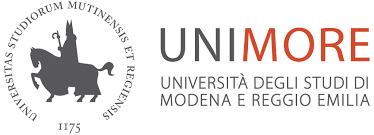
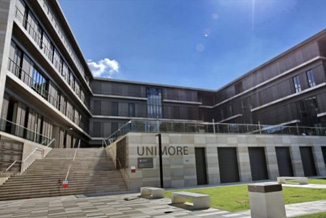
Università degli Studi di Modena e Reggio Emilia
The University of Modena dates back to 1175, a few decades after the founding of the University of Bologna, making it one of the oldest universities in Italy and the world. It was established by the city of Modena, which financed professors’ contracts through local taxation. The first to be invited to teach was Pillio da Medicina from Bologna. The School of Law (Studium iuris) was subsequently formed around him and made up the nucleus of the University.
UNIMORE is committed to high-quality research. It is ranked among the top 8 comprehensive universities in Italy for its high level of research, according to the most recent assessment of the Italian Ministerial Committee for the Evaluation of Research (CIVR).
Ongoing research is conducted by 21 university departments representing all the principal disciplines, by 11 integrated medical departments, and by numerous departmental and interdepartmental centers involved in specialized research activities. Many of them are nationally and internationally recognized.
The scientific publications of the University have been over 7000 just in the past 4 years. Of these, around 4000 have been published in scientific journals worldwide and 3000 in collaboration with international researchers and institutions.
With 16 filed patents and 3 spinoffs in the biotechnological field from 2017 to today, the University poses itself as an Italian centre of excellence for research and innovation.
Con 16 brevetti depositati e 3 spinoff costituiti in ambito biotecnologico dal 2017 ad oggi, Unimore si configura come un centro di eccellenza italiano di ricerca ed innovazione.


Università degli Studi di Roma – La Sapienza
Sapienza is one of the oldest Italian universities, founded in 1303 by Pope Boniface VIII. Today, it is a proper research university where you can research and study in all academic areas, placed among the top Italian universities in the main international rankings.
It is the largest university in Europe with over 120.000 students enrolled in more than 290 undergraduate and postgraduate degrees, of which 60 taught in English, 200 masters, 80 PhD courses and 80 specialised schools.
Sapienza promotes and pursues excellence in every research aspect, focusing on innovation and support to entrepreneurship, and it is able to achieve so by also leveraging on the national and international opportunities that the current market offers in this historic moment in which the pandemic has further enhanced the central role of research as a solution to society and the overall territory.
In this context it is of fundamental importance to provide support to the entire research chain, sustaining basic and applied research, promoting interdisciplinary and cross-sectoriality, promoting the transfer of results to the industries and society, as well as favouring the evaluation of research quality.
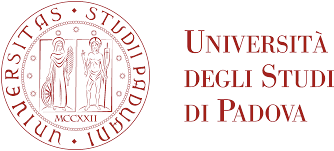

Università degli Studi di Padova
800 years of history. It was 1222 when the Studium Patavinum was founded in Padua, a place of study ready to welcome ‘scholars and doctors’, also from various European countries, in search of freedom of culture and expression. That freedom expressed by the motto that still today identifies the University and expresses its essence: Universa universis patavina libertas.
With more than 70,000 students, 2,200 lecturers, over 2,400 administrative technicians, more than 13,000 graduates each year, 5,000 scholarships awarded, 32 departments, more than 2 million books available in 29 libraries, and a teaching offer of excellence and in continuous transformation, the University of Padua has long been ranked among the highest in the main national and international rankings for the quality of teaching, research and services.
The University is strongly committed to developing partnership and technology engagement projects aimed at building a society of knowledge and innovation. This includes objectives and actions aimed at commercialising research products, including through innovative methods involving start-ups and spin-offs in addition to traditional forms of licensing.
To date, Unipd has registered 6 spinoffs and 29 patents relating to the biotechnology sector, ranking among the best universities nationwide in terms of technology transfer activities. One in particular, Altheia Science, has raised over €18M for a Series A funding round.

District H-BIO Puglia Scrl
The “District H-BIO Puglia Scrl” is a specialised non-profit district in the Apulia region for the development and innovation of the biotechnology regional eco-system. In particular, it emphasizes the area of care and rehabilitation products:
Drug development including gene or cell therapy, tissue engineering (regenerative medicine), technologies and services for drug discovery and drug delivery. This area includes the development of new production processes, new enzymes for biotransformations, innovative biomaterials and biomembranes, innovative methodologies for the quality control of products obtained through new production processes. Furthermore, the sector envisages the involvement of basic pharmaceutical skills in order to allow the transfer and exchange of expertise between traditional and biotech drug or diagnostic development procedures.
The district also carries out the following activities with the objectives of:
- the strengthening and synergy of the research and development activities of the consortium members and of the technological district area;
- the recall, in the regional area of the technological district, of new research and development structures of national and international companies;
- the launch of new entrepreneurial initiatives, pertaining to the advanced sector covered by the technological district;
- to training / advanced training;
- to create the conditions for the return of researchers from abroad

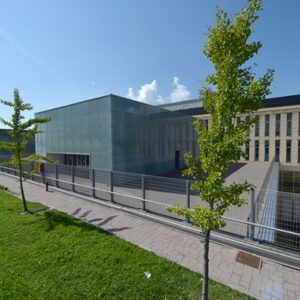
Università degli Studi di Trento
The University of Trento (UniTrento) is a medium-sized University in Italy in top positions in national rankings and well positioned in international ones. Since its foundation in 1962, the University of Trento has been characterized by being a research-oriented University. Indeed, the University recognizes the relevance of promoting free knowledge-based research and supports it by ensuring researchers funds and supporting services. UniTrento is composed by more than 16,000 students, about 600 professors and researchers and the same number of technical and administrative staff, thus indicating that the University can provide an ideal environment for study and research.
The University of Trento is more and more investing on the creation of innovative knowledge and on social impact, by promoting valorisation and public engagement policies and activities, thus positioning UniTrento among the national and international references for innovation and the synergistic relationship between research and entrepreneurship. UniTrento is active in supporting the valorisation of UniTrento’s research results and it has given rise to 48 patents, of which 21 in the biotech/medical field and 25 academic startups over the years.
The knowledge transfer activities, promoted by UniTrento through the Division for the Valorisation and Impact of Research, are also supported by Trentino Innovation Hub Foundation (HIT), an instrumental body of the Autonomous Province of Trento and a research and knowledge dissemination body. Through the sustainable valorisation of innovation and research results, HIT supports the development and growth of the territory, promoting the match between the excellence of the scientific and technological research of its founders (University of Trento, Fondazione Bruno Kessler, Fondazione Edmund Mach, Trentino Sviluppo) and market opportunities and requests for innovation.

